Alexander J. Motyl's Blog, page 15
March 13, 2014
Kissinger Misunderstands Ukraine
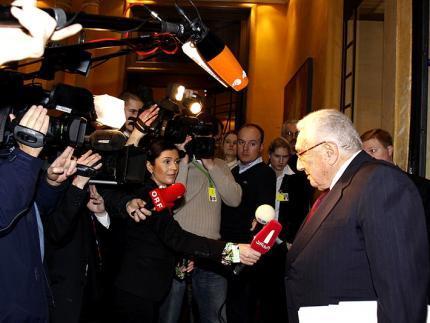
When a renowned American statesman such as Henry Kissinger exhibits alarming ignorance about Ukraine, you’ve got to worry. In a March 5th op-ed in the Washington Post, Kissinger got just about everything wrong, even though, remarkably, his prescriptions for resolving the Russo-Ukrainian standoff still managed to be worthy of consideration.
Consider this passage:
The West must understand that, to Russia, Ukraine can never be just a foreign country. Russian history began in what was called Kievan-Rus. The Russian religion spread from there. Ukraine has been part of Russia for centuries, and their histories were intertwined before then. Some of the most important battles for Russian freedom, starting with the Battle of Poltava in 1709, were fought on Ukrainian soil.
Russian history did not begin only in Kyivan (or Kievan) Rus, as Kissinger says. It began in many places, including Russia. Similarly, America’s history began in England as well as in many other places. Every country’s history has multiple roots: Belarusian history also began in Kyivan Rus. Kissinger’s mistake is to advance a tidy—and anti-historical—view of history that justifies imperial Russia’s standing claims to Ukrainian territory. According to his logic, America would be justified in claiming Ontario. By the way, “what was called Kievan-Rus” was in fact a state, one of Europe’s largest at that time.
Pace Kissinger, the Russian religion did not spread from “what was called Kievan-Rus.” What spread was Orthodox Christianity and it spread from Constantinople, thanks in no small measure due to the proselyting efforts of Ss. Cyril and Methodius, both Greeks. True, Ukraine “has been part of Russia for centuries,” but it’s been no less a part of the Mongol empire, the Grand Duchy of Lithuania, the Polish Commonwealth, the Habsburg Empire, and the Ottoman Empire. The Battle of Poltava was a battle between two empires, the Swedish and Russian, and had nothing to do with “Russian freedom” or independence. Imperial struggles never do. And if anyone lost their freedom as a result of the battle, it was the Ukrainian Cossacks under Hetman Ivan Mazepa, who sided with King Charles XII against Czar Peter I.
There’s more:
Crimea, 60 percent of whose population is Russian, became part of Ukraine only in 1954, when Nikita Khrushchev, a Ukrainian by birth, awarded it as part of the 300th-year celebration of a Russian agreement with the Cossacks. The west is largely Catholic; the east largely Russian Orthodox. The west speaks Ukrainian; the east speaks mostly Russian.
Crimea’s population was 58 percent Russian in 2001; with low birth rates and high death rates, the Russian probably comprise about 55 percent today. Crimea’s population was mostly Crimean Tatar until 1944, when Stalin deported the entire Tatar population (numbering around 200,000) to Uzbekistan in a brazen act of ethnic cleansing and genocide (about half died en route). Moreover, Crimea possessed the status of an Autonomous Soviet Socialist Republic (with both Crimean Tatar and Russian as official languages) until 1945, when, cleansed of the Tatars, it was converted into a Russian province and rapidly populated with Russian settlers, mostly veterans.
Khrushchev was not a Ukrainian, but an ethnic Russian born in Ukraine. The Ukrainian west is as Orthodox as it is Catholic; the east is not “Russian Orthodox,” but simply “Orthodox,” with parishes being affiliated with the Moscow Patriarchate and the Kyiv Patriarchate. The west speaks more Ukrainian than Russian, the east speaks more Russian than Ukrainian, but most people, especially in the center, are at home with both languages.
One final passage:
The politics of post-independence Ukraine clearly demonstrates that the root of the problem lies in efforts by Ukrainian politicians to impose their will on recalcitrant parts of the country, first by one faction, then by the other. That is the essence of the conflict between Viktor Yanukovych and his principal political rival, Yulia Tymoshenko. They represent the two wings of Ukraine and have not been willing to share power.
The ignorance on display here is especially alarming as it completely misrepresents the political reality in today’s Ukraine: “the two wings of Ukraine” are not equally responsible for the mess Ukraine is in. Responsibility rests squarely with Yanukovych and his criminal Party of Regions, and for Kissinger to suggest otherwise is to engage in the greatest of ethical and political obfuscations and moral equivalences.
It is nonsense to suggest that Presidents Kravchuk, Kuchma, and even Yushchenko tried to “impose their will on recalcitrant parts of the country.” Kravchuk and Kuchma always walked a fine middle line. Yushchenko adopted a more pro-western rhetoric, but never had the political will to impose on the east—or for that matter on anybody else. Yushchenko shared power with the Party of Regions, and Yanukovych himself served as Yushchenko’s prime minister from August 4, 2006 to December 18, 2007. After losing the presidential elections of 2010, Tymoshenko “shared power” with the winner, Yanukovych, who, one and a half years later, threw her into jail. And the defining conflict in recent Ukrainian politics is not that between Tymoshenko and Yanukovych but between Tymoshenko and Yushchenko.
Fortunately, Kissinger does have some sensible things to say about resolving the ongoing war:
1. Ukraine should have the right to choose freely its economic and political associations, including with Europe.
2. Ukraine should not join NATO, a position I took seven years ago, when it last came up.
3. Ukraine should be free to create any government compatible with the expressed will of its people. Wise Ukrainian leaders would then opt for a policy of reconciliation between the various parts of their country. Internationally, they should pursue a posture comparable to that of Finland. That nation leaves no doubt about its fierce independence and cooperates with the West in most fields but carefully avoids institutional hostility toward Russia.
4. It is incompatible with the rules of the existing world order for Russia to annex Crimea. But it should be possible to put Crimea’s relationship to Ukraine on a less fraught basis. To that end, Russia would recognize Ukraine’s sovereignty over Crimea. Ukraine should reinforce Crimea’s autonomy in elections held in the presence of international observers. The process would include removing any ambiguities about the status of the Black Sea Fleet at Sevastopol.
All four “principles” are reasonable starting points for a discussion. Of course, they all assume that President Putin is, as Kissinger writes, “a serious strategist—on the premises of Russian history.” (That qualifier is worrisome: one could, by the same token, say that Adolf Hitler is “a serious strategist—on the premises of German history.”) If Kissinger is right, then Putin just might be convinced to come around to considering these four points. If Kissinger is wrong—and Putin’s warmongering rhetoric, continued military buildup in Crimea, and incursion into Kherson Province, north of Crimea, are not reassuring—then nothing short of a firm Western stand to contain Russia and protect Ukraine can end his imperialist assault on Ukraine and the international order.
OG Image: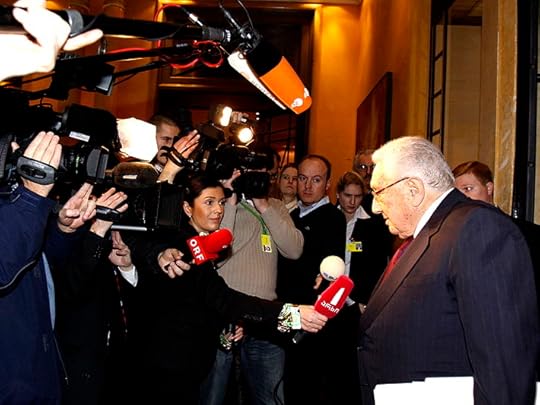
March 5, 2014
Ukraine's Chief Rabbi Refutes Putin's Anti-Semitic Charges
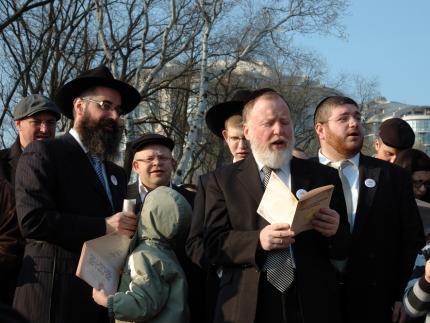
Russian President Vladimir Putin and his supporters in Russia and the West have accused the Ukrainian opposition that led the fight against the criminal Yanukovych regime and the democratic Ukrainian government that succeeded that regime of being fascist, neo-Nazi, and anti-Semitic.
The following quotations—by Putin and his most unremitting academic supporter in New York City on the one hand, and by three of Ukraine’s leading Jewish officials on the other—should settle the issue. Putin is beyond redemption, of course, but Professor Cohen may want to take account of the evidence and, like a good revisionist historian, revise his views.
Vladimir Putin, president of the Russian Federation, March 4, 2014:
Armed and masked militants are still roaming the streets of Kiev…. We see the rampage of reactionary forces, nationalist and anti-Semitic forces going on in certain parts of Ukraine, including Kiev…. [W]e understand what worries the citizens of Ukraine, both Russian and Ukrainian, and the Russian-speaking population in the eastern and southern regions of Ukraine. It is this uncontrolled crime that worries them.
Yaakov Dov Bleich, chief rabbi of Ukraine, March 3, 2014:
Rabbi Yaakov Dov Bleich, a chief rabbi of Ukraine, accused Russia of staging anti-Semitic “provocations” in Crimea in order to justify its invasion of the former Soviet republic. At a press conference in the Manhattan office of the United Jewish Communities of Eastern Europe, Bleich compared Russia’s behavior to that of the Nazis prior to the Anschluss invasion of Austria in 1938.
"Things may be done by Russians dressing up as Ukrainian nationalists,” he said, adding that it’s “the same way the Nazis did when they wanted to go into Austria and created provocations.”
Bleich, a vice president of the World Jewish Congress, also announced the creation of an aid effort, KievRelief.org, to fund security for synagogues and mosques and to provide humanitarian relief for all Ukrainians. Bleich, who moved to Ukraine in 1989 from Brooklyn, was slated, along with other Ukrainian political and religious leaders, to meet with Secretary of State John Kerry on Tuesday. He said he will urge Kerry to be assertive with Russian President Vladimir Putin, to move the G8 Summit to Kiev, as a show of solidarity with Ukrainians, and to consider sending military support to Ukraine. While acknowledging that Americans are “war-weary,” he said Ukrainians need “boots on the ground to protect democracy” and to prevent “the cold war from getting hot.” Asked about anti-Semitism among Ukrainian nationalists, particularly two far-right parties that have been included in the new government, Bleich acknowledged concerns but said the Jewish community has received assurances from top government leaders that their safety will be protected.
“The Russians are blowing this way, way out of proportion,” he said, referring to the issue of anti-Semitism among some Ukrainian nationalist factions. He said that Ukrainians were united in response to the Russian intervention. “There were many differences of opinion throughout the revolution, but today all that is gone,” he said. “We’re faced by an outside threat called Russia. It’s brought everyone together.”
Rabbi Misha Kapustin, rabbi of the Simferopol Reform Synagogue Ner Tamid, Crimea, March 3, 2014:
Many here are against the Russians but are afraid to talk. I am a Ukrainian citizen and want to live in democratic Ukraine. The government has always provided protection for the Jews, and all the talk of anti-Semitism is exaggerated. The Russians have invaded illegally and that must be opposed. So far, people have encouraged me and I don’t believe my petition will cause any harm to the Jews.
Stephen F. Cohen, professor of Russian studies and history at New York University, January 30, 2014:
… the street in Kiev is now controlled by these right-wing extremists. And that extremism has spread to western Ukraine, where these people are occupying government buildings. So, in fact, you have a political civil war under way. What is the face of these people, this right wing? A, they hate Europe as much as they hate Russia. Their official statement is: Europe is homosexuals, Jews, and the decay of the Ukrainian state. They want nothing to do with Europe. They want nothing to do with Russia. I’m talking about this—it’s not a fringe, but this very right-wing thing. What does their political activity include? It includes writing on buildings in western Ukraine, “Jews live here.” That’s exactly what the Nazis wrote on the homes of Jews when they occupied Ukraine. A priest who represents part of the political movement in western Ukraine—Putin quoted this, but it doesn’t make it false. It doesn’t make it false; it’s been verified. A western Ukrainian priest said, “We, Ukraine, will not be governed by Negroes, Jews or Russians.” So, these people have now come to the fore.
On the websites of some parties close to the government, such as those of Viktor Medvedchuk [a Putin ally], Natalia Vitrenko [head of the pro-Stalin Progressive Socialist Party of Ukraine], and the Berkut [the riot police responsible for the mass killings in Kyiv], there have appeared in the last two-three weeks many anti-Semitic materials that state that the Jews organized the Maidan. That’s completely absurd, but it’s believed by those who with batons and shields face down the activists. They [the riot police] are being told: look, the Maidan is the work of Jews, so don’t spare anyone, beat them all.
Josef Zissels, January 14, 2014:
The moving force of the Maidan is not the opposition parties, and certainly not the weakest of the opposition parties in the parliament, Svoboda. The moving force of the Maidan are the citizens of Ukraine… The Maidan has no leader. The Maidan is over 40 social organizations and various citizens’ groups. They are Ukraine’s civil society….
I view the coalition of three right parties in Ukraine (Svoboda does not appeal to me as a party) as a factor with which one must come to terms. Svoboda acquired 10.5% of the vote, entered parliament, and became a member of the opposition coalition. I view this situation as a phenomenon similar to the People’s Front in France during World War II: against the common enemy there united communists, social democrats, monarchists, anarchists, and other very different forces.
Ukraine’s key problem is not Svoboda, although Svoboda does indeed represent a certain kind of internal Ukrainian problem. The key problem is the government, its corruption, and its attempt to impose an authoritarian—and as its attack on the Maidan showed, even a totalitarian—form of rule on the country. The opposition united in that conflict with the government. Once the problem of the government is solved, once there will be the first unfalsified elections, then will be the time to deal with our “right-wingers” and “left-wingers.” At the moment, we are all allies against a very powerful enemy.
P.S. On March 4th, Ukrainian Jews wrote an open letter to Putin in which they repeat many of the points made in the above quotations.
OG Image: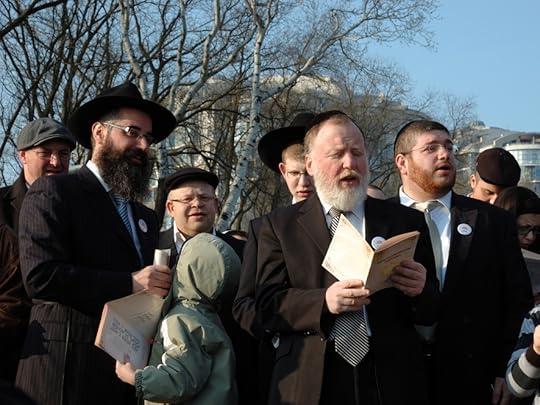
March 3, 2014
Will Putin's Invasion Backfire?
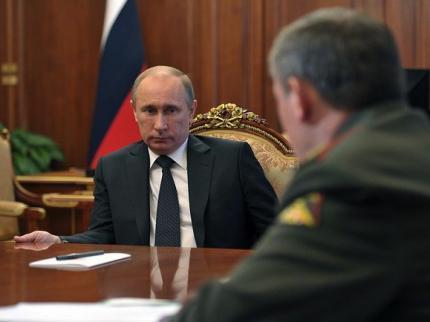
Back in the early 1990s, when the Russian chauvinist Vladimir Zhirinovsky first reared his loony head, analysts began discussing the “Weimar Russia” scenario. Accordingly, the chaos of the late-Gorbachev period (Weimar) would be followed by the emergence of a strong man à la Adolf Hitler (Zhirinovsky), who would impose order, consolidate the nation, and lead it to some imagined form of glory.
The scenario didn’t work for crazy Vlad, but it turned out to be useful in understanding subsequent developments in Russia. The chaotic period of Boris Yeltsin’s presidency in the 1990s proved to be similar to Weimar Germany in the 1920s: in both cases, imperial collapse, economic hardship, and political humiliation were blamed on democracy and the democrats. And Vladimir Putin turned out to be Russia’s version of the Führer. Both came to power legally, developed cults of the personality, dismantled democracy and made the trains run on time, employed chauvinism and neo-imperialism to legitimize their rule, remilitarized their states and promised to make them great powers, and made it their mission to in-gather ethnic brethren in neighboring states.
I’ve been writing for several years now that Putin’s system has all the features of a “fascistoid” state (see “Fascistoid Russia,” March/April 2012). I had defined fascism as a non-democratic, non-socialist political system with a domineering party, a supreme leader, a hyper-masculine leader cult, a hyper-nationalist, statist ideology, and an enthusiastically supportive population. And I had argued in the March 2010 issue of the Harriman Review (pdf) that, “although Putin’s Russia possesses many of the defining characteristics of fascism, it does so only to a greater or lesser extent. Having emerged haphazardly, these characteristics have not yet assumed the form of a consolidated political system; nor is it clear that they are here to stay. In that sense, Russia today resembles Germany in 1933 or Italy in the early-to-mid-1920s. Russia could follow in their footsteps, or it could falter and find its way back to some form of democracy or authoritarianism. Located somewhere between authoritarianism and fascism, today’s Russia may therefore be termed fascistoid.”
You can judge for yourself whether Putin’s Russia has become more or less fascist since 2010.
I had also concluded that:
All fascist states scare their neighbors and provoke them to defend themselves against perceived threats emanating from the behavior and bluster of fascist leaders. In that sense, fascist hyper-nationalism becomes a self-fulfilling prophecy—effectively creating the very enemies it invokes as the reasons for its justification. The soldiers and policemen who run fascist states have a natural proclivity to toughness and weaponry. The hyper-nationalism, state fetishes, and cult of hyper-masculinity incline fascist states to see enemies everywhere. The cult-like status of leaders encourages them to pound their chests with abandon. And the population’s implication in its own repression leads it to balance its self-humiliation with attempts to humiliate others. Unsurprisingly, Russia has taken to asserting its “rightful” place in the sun by engaging in energy blackmail vis-à-vis Ukraine, Belarus, and the Baltic states, cyber-wars against Estonia, a war against Georgia, Polar land grabs, saber-rattling in the Crimea, and other forms of aggressive behavior.
Putin’s invasion of Ukraine fits the above pattern all too neatly. The only question is: is the invasion comparable to Hitler’s annexation of German-inhabited Sudetenland, to Hitler’s Anschluss of Austria, or to Hitler’s attack on Poland? In the first case, Putin might go no farther than Crimea. In the second, he might try to occupy all of Ukraine. In the third, he’d settle for eastern Ukraine.
Whatever Putin’s choice, he’ll have to expend enormous resources on pacifying a hostile population. According to a public opinion survey conducted in mid-February by the Kyiv International Institute of Sociology, support for unification with Russia stands at only 26 percent in Ukraine’s east and 19 percent in the south. In Crimea, supposedly a hotbed of Russian irredentism, only 41 percent want to join Mother Russia.
The Crimean invasion may turn out to be the greatest strategic blunder of Putin’s career. Indeed, it could even lead to the end of Putinism.
If Putin knew his history, he’d know that nothing consolidates post-revolutionary regimes like invasions. Some counter-revolutionaries join the invaders, but most people put aside their differences and rally around the flag. The threat of existential annihilation strengthens post-revolutionary states, invigorates national identities, and encourages leaders to adopt radical change. The ongoing Ukrainian response to Putin’s invasion fits this bill to a tee: even the country’s top oligarchs, all Russian speakers, have condemned the invasion and rejected partition. When the crisis ends, Ukraine will be stronger and its diverse population may finally possess all the features of a modern nation. Ironically, Putin might accomplish what Ukraine’s elites have thus far failed to achieve: effective state building and genuine nation building. And that Ukrainian state and that Ukrainian nation are as unlikely to regard him with affection as they are certain to want good relations with a democratic Russia rather than Putin’s.
Putin’s naked aggression has also outraged the international community and, in particular, the United States and European Union. (In this respect, the Weimar Russia scenario does not, fortunately, hold: the democracies have not responded to Putin’s aggression with Munich-like appeasement.) Ordinary Russians will suffer as a result, even as Putin persuades them that his chest-beating is an adequate substitute for a good life.
Although some two-thirds of Russians currently support Putin, that number could drop precipitously if body bags arrive in Moscow and the stagnant Russian economy creaks under the burden of military adventurism. Wars and occupations are expensive, especially for states with declining reserves of energy-generated easy money. How will Russians react? By happily dying for a dictator or by taking to the streets? How will Russian elites react? By supporting an irrational leader or by jumping ship? Russia’s Führer would do well to remember that the Argentine invasion of the Falklands brought down the military junta in Buenos Aires.
Photo Credit: www.kremlin.ru
OG Image:
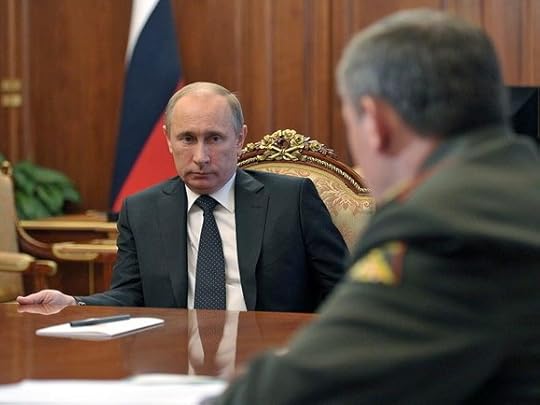
February 25, 2014
Ukraine's Opportunity for Genuine Democracy
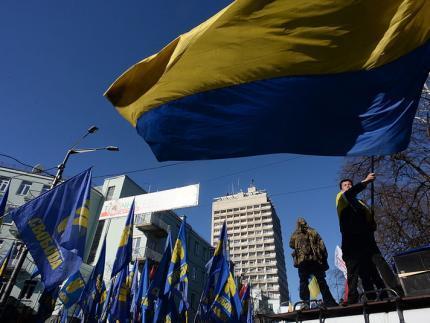
After 23 years of formal independence, Ukraine stands poised to take the final steps toward genuine independence by liberating itself from what has become the legacy of Soviet communism throughout its former empire—rule by criminal and thuggish regimes and oligarchs. Ukraine finally has the opportunity to join the civilized world where constitutions and rule of law, not party hacks and bullies, reign supreme.
The sudden, rapid, and comprehensive collapse of the criminal Yanukovych regime surprised many—especially after the butchery that just preceded it—but it was preprogrammed by the nature of the regime. Extreme centralization of authority in the hands of an incompetent sultan whose entire agenda consisted of self-enrichment guaranteed bureaucratic fragmentation, regime illegitimacy, and popular anger. Lacking an ideological raison d’être and resting only on the willingness of security forces to sustain it, the brittle regime crumbled once President Yanukovych ordered mass killings, democratic revolutionaries in Kyiv refused to be cowed, provincial uprisings swept the country, and Regionnaires realized their careers—and lives—were on the line. As soon as the Regionnaire thugs began fleeing en masse, the security forces became isolated, Yanukovych’s cronies jumped ship, and he had to run. Graft, theft, and coercion proved to be insufficient to keep the mafia regime intact.
The Party of Regions has become eviscerated; it and the Communist Party are still represented in Parliament, but both must rethink the retrograde Soviet values that inspired them in order to survive. Propelling that rethinking is the fact that democratic Ukraine intends to try the top 25 regime representatives for crimes against humanity. If and when Yanukovych, who heads the list, is captured and put on trial, the full extent of the regime’s criminality will come to light and discourage Regionnaire holdouts from attempting a comeback. The democratic authorities are also planning a “lustration” similar to investigations of criminal wrongdoing by regime collaborators in Central Europe and South Africa.
A key part of the repudiation of the Soviet past is the continued toppling of Ukraine’s approximately 1,300 remaining Lenin statues and the renaming of streets, squares, and the like. Twenty-five Lenins met their end in just two days last week. In a foretaste of things to come, the eastern Ukrainian city of Dnipropetrovsk renamed Lenin Square “Heroes of the Maidan Square,” in honor of the demonstrators shot and killed by Yanukovych’s hirelings on Kyiv’s Independence Square. The Soviet star adorning the Parliament has also been removed.
These and many other measures stand a good chance of moving Ukraine in the direction of post-communist Poland, the Baltic states, and their Central European neighbors, which understood, when the USSR collapsed, that a radical break with the Soviet past was the precondition of a lasting shift toward sustainable democracy, rule of law, and a market economy. In effect, Ukraine is now at the same point they were in 1989–91.
Except that Ukraine is also far worse off. In addition to 70 years under communist totalitarianism and Russian imperialism, Ukraine suffered incalculable damage due to four years of untrammeled Regionnaire exploitation. The treasury is empty. State institutions have been eviscerated. The economy is on the verge of collapse. Rule of law has disappeared. And, unlike in 1991, when Russia was weak and in retreat, Putin’s Russia is much stronger and more aggressive.
Will the democratic revolution succeed?
Cautious optimism is the order of the day. Repudiation of the Soviet past and the institutional devastation caused by the “Yanukovych Ruin” give the democrats the opportunity to start from a clean slate. The Regionnaires and Communists are on the run and, quite possibly, on the verge of extinction. Three months of intense struggle and close to 100 dead have created an unprecedented esprit de corps among democrats. For the first time, they agree on strategic goals: Europe, democracy, rule of law, and the market; most of the population supports the goals of the revolution; and the United States and Europe support Ukraine. Once the EU Association Agreement is signed, it will provide Kyiv with a road map of change. The democrats also know that, if they fail, Ukraine will fail, and that the Maidan activists who fought the regime and sacrificed their lives will fight them if they dither and squabble.
Will Russia lead a charge to reinstall the ancien régime or break off bits of Ukraine? The former scenario is almost impossible, as the regime has melted away and there is no one left to reinstall. The former is theoretically possible—at least in the Crimea—although it would mean that President Putin has lost all his geopolitical marbles. If Putin does throw all caution to the wind and acts only on irrational impulse, he will only consolidate democratic rule in Ukraine (nothing rallies people around the flag as much as foreign intervention: even Yanukovych’s financial backer, the multibillionaire Rinat Akhmetov, spoke out against partition on February 24th) and provoke Russian democrats and Crimean Tatars to take to the streets (or, possibly, to arms—in which case, you can kiss the peninsula’s vaunted beaches good-bye). Such action would also be warning Belarus and Kazakhstan that they might be next. When the dust settles, democratic Ukraine will still be standing, Putin’s Russia could be destabilized, and his Customs Union and Eurasian Union would essentially be kaput. An intervention or economic embargo would bring Putin’s Russia nothing at best and enormous risks at worst.
The next few months will be heady, as the Parliament and government adopt a variety of important measures to pull back the country from bankruptcy, reintroduce democracy, and move Ukraine irreversibly toward Europe. There will be setbacks. Euphoria will alternate with despair. There may be pushback from desperate Regionnaires. In time, policy details will come into play and divisions will appear in the ranks of the democrats. Ideals will be sullied. Compromises will be reached. Charges of spinelessness will be leveled. Fortunately, these charges will probably be leveled after strategic shifts have taken place and Ukraine has seceded from its Soviet past. And then, with just a little luck, Ukraine could become a normal polity where democratic politics, both clean and dirty, becomes the norm.
OG Image: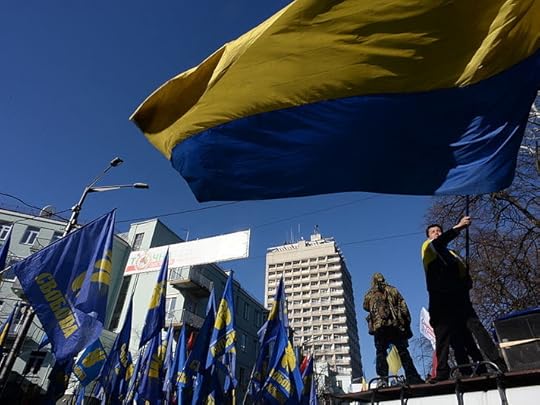
February 19, 2014
Ukraine's Day of Infamy
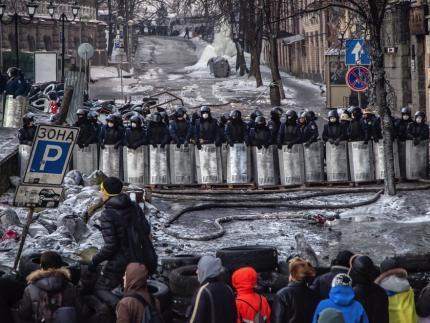
Tuesday, February 18, 2014, will go down in European history as a day of infamy. It was then that Viktor Yanukovych declared war on his own people.
In retrospect, his decision to kill and maim Ukrainians looks inevitable. In 2010, he arrogated to himself the powers of a sultan. Thereafter, he progressively dismantled all of Ukraine’s democratic institutions and undermined all its freedoms. Finally, he and his cronies systematically looted the country to the tune of more than $10 billion. Having consistently treated the Ukrainian people as second-class citizens whose sole function consisted in serving the needs of the ruling Regionnaires, Yanukovych finally took his disdain for the nation to its logical conclusion: he began to butcher them.
Yanukovych claims that he is Ukraine’s legitimate president, that the protesters reject the constitutional solutions that he, the supposed moderate, supports, and that they are responsible for the violence. Don’t believe him for a second.
Democratically elected leaders become illegitimate tyrants the moment they turn against the people who elected them. Yanukovych abandoned whatever minimal claims to legitimacy he may have had back in 2010. The amazing thing is that Ukrainians actually hoped against hope for three years before deciding that the man had to go.
For three years, the democratic opposition has been pleading with Yanukovych to adhere to Ukraine’s Constitution. To no avail. He’s violated it at whim. For three months now, ever since the protests in Kyiv began in late November, the protesters have pleaded with him to talk, to compromise, to acknowledge their existence and the legitimacy of their demands. To no avail. Yanukovych’s only response has been violence: beatings, killings, fire-bombings, and disappearances. The massive violence of February 18th is just the logical conclusion of the daily violence he’s engaged in since November.
In declaring war on Ukrainians, Yanukovych has sealed his own fate. He thinks he’s reestablishing control. In reality, the violence is an act of desperation that will only hasten his own downfall.
Regionnaire parliamentarians have begun fleeing the country and taking their hard currency with them. One of the most thuggish Regionnaires, Oleg Tsaryov, has publicly distanced himself from “Yanukovych’s decision” to engage in violence. More than half of Ukraine is already up in arms: government buildings have been seized, central authority has been rejected, and riot police have been disarmed. Even if Yanukovych succeeds in crushing the demonstrators on Kyiv’s Independence Square, the Euromaidan epicenter, opposition will simply go underground or morph into other forms.
What Yanukovych doesn’t understand—and has never understood—is that you can’t stop millions of people from wanting to live freely and in dignity.
It’s high time for the European Union to understand that as well. Do Europeans really believe in their vaunted European values? Do they care that Ukraine may be on the verge of becoming another Bosnia? Do they care that Yanukovych could be on his way to becoming another Slobodan Milosevic? If democracy and human rights mean anything to Europe, if they mean at least as much as access to Russian gas and ample supplies of beer and wine, then the European Union has to move from declarations of support and threats of sanction to actual sanctions. Immediately.
As it is, the European Union lacks credibility with Yanukovych. Explicitly stating that sanctions might be imposed only if bloodshed occurs was an invitation to Yanukovych to continue with harsh crackdowns. Like the Regionnaires in general, Yanukovych doubts that the Europeans will ever act forcefully—even if Ukraine becomes another Bosnia and the cost of EU intervention skyrockets. As the democratic analyst Oleksii Haran rightly said last week, “If the EU does not take decisive steps, it will share responsibility for bloodshed in Ukraine and hundreds of thousands of refugees.” Now blood has been shed—lots. Yanukovych bears all the responsibility for the crimes. But the Europeans, alas, have committed a serious sin of omission. They could have made a difference. But didn’t. They looked the other way.
Sanctions will no longer stop the bloodshed. It’s too late for that. But they would have two important consequences. They’d redeem Europe morally. And they’d hasten Yanukovych’s end. And that end is inevitable. No tyrant can declare war against his own people and hope to survive for long. When Yanukovych finally decides to flee the country, Europe could at least have the decency to deny him entry.
OG Image: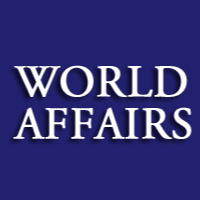
February 14, 2014
Should There Be One Ukraine?
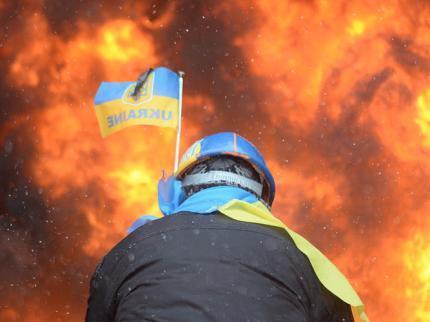
As the criminal Yanukovych regime’s violence, terror, and repression are driving Ukraine to armed conflict and, possibly, fragmentation, it may be worth asking whether Ukraine might not be better off without some of its southeastern provinces.
First let’s consider the bad reasons for a breakup—Ukraine’s diversity in general and the regional, ethnic, confessional, and cultural divisions between its “West” and “East” in particular. A good place to start is a recent article by Orlando Figes, professor of history at Birkbeck College, University of London, “Is There One Ukraine?” Figes, who should know better coming from the UK, writes about Ukraine’s divisions as if they were unique and as if diversity alone justified or led to breakup. He’s wrong on both counts. Ukraine’s diversity is pretty much the norm for all stable states everywhere.
Is there one United States or are the divisions between North and South and Red and Blue states indicative of many Americas? Try telling the Quebeckers that there is only one Canada. Is there one Germany—or two (East Germany and West Germany) or several (Bavaria, the Rhineland, Berlin, and the rest)? Needless to say, there are many Russias—one centered on the Moscow-Petersburg axis, another in Siberia, yet a third in the Far East. And that’s not even counting the non-Russian regions of the Russian Federation. How many Turkeys are there? I can name at least three: secular Istanbul, conservative Anatolia, and the Kurdish east. China? Go tell the Tibetans and Uighurs they’re Han Chinese. India? Let’s not even go there. Austria? Vienna, as anyone who’s been to the country knows, is a world apart from the Tyrol. Perhaps Italy is one country? Take a train from Milano to Palermo and then answer the question. Surely France is one? Mais, non—as the Bretons, Basques, Provençals, Parisians, and many others can tell you. Isn’t Israel a homogeneously Jewish state? Only if you disregard the Arabs and the enormous distinctions between secular and religious, Sephardic and Ashkenazy Jews. And so on and so forth. The only country that may be “one” country is, possibly, Japan, and that may be because it’s an island state.
Here’s another question. Has any country ever been “one” country—especially twenty-odd years after its establishment? The United States was a loose agglomeration of former colonies—and, oh, yes, there was that slavery thing between the North and the South. Canada? Ditto. Otto von Bismarck’s Germany? Mazzini’s Italy? Ditto, ditto. And how about the country Figes studies—Russia? It’s always been a multinational empire marked by enormous regional, ethnic, and confessional diversity, as Figes knows..
Now, I don’t know whether diversity is, as the conventional wisdom insists, a source of strength. But I do know that it’s a fact of life—for countries, for universities, for corporations, for everybody. In this sense, Ukraine is normal and anything but atypical. (By the way, the same applies to Ukrainians: they’re neither better nor worse, neither more nationalistic nor less nationalistic, neither more generous nor less generous, neither more anti-Semitic nor less anti-Semitic, neither smarter nor dumber than any other people.)
What is unusual about contemporary Ukraine is that it’s exploited by a criminal gangster regime—Yanukovych’s— in cahoots with another criminal gangster regime—Putin’s. Many countries have the misfortune of being misruled by homegrown camarillas. Many countries have the misfortune of being dominated by predator states. Ukraine has the double misfortune of being misruled at home and “mis-dominated” abroad.
That’s why Figes’s suggestion—“Ukraine ought to consider applying a precedent from elsewhere in eastern Europe: deciding the country’s fate by referendum”—wouldn’t work. Personally, I have no doubt that Ukraine without its southeast would be much stronger, more stable, and more prosperous than Ukraine with its southeast. The southeast’s rust-belt economy needs either to be shut down entirely or to be refitted at the cost of trillions of dollars of non-existent investments. Moreover, the statistics plainly show that Kyiv subsidizes the Donbas, and not vice versa. The southeast also has a low birth rate, a high death rate, low life expectancy, high energy consumption, and high AIDS and crime rates. Last but not least, the southeast is home to the ruling Party of Regions and the Communist Party. Remove the southeast and Ukraine’s treasury experiences an immediate boon; its demographics, energy consumption, and health improve; and its politics automatically become more democratic and less corrupt.
Although lopping off the Donbas would benefit the rest of Ukraine, Yanukovych’s mafia regime desperately needs Ukraine to be whole. If Luhansk and Donetsk were to split away, their rust-belt economy would collapse without Kyiv’s financial support and the Regionnaires, trapped in their polluted bailiwick, would have nothing to steal. And what would Yanukovych’s multibillionaire pal, Rinat Akhmetov, do without easy access to Ukraine’s resources? A similar logic holds for Putin. What would he do with a rotten slice of Ukraine—a kind of mega Transnistria? Subsidize its dead-end economy? Spend valuable time and resources on jailing the corrupt Regionnaires and the troglodyte Communists? No, a weak Yanukovych regime in a weak Ukraine serves Putin’s interests perfectly.
So, forget a referendum. No Regionnaire-controlled regime will ever agree to it and, were one to take place, Donbas-based Regionnaires would do everything possible to guarantee an anti-secession vote. The Regionnaires need to be in Ukraine; more than that, they need the threat of secession to compel spooked democrats to make concessions. But the threat is hollow, precisely because Ukraine would be much better off without the Donbas and Regionnaires. The sooner the democrats realize this, the better.
The moral for the democrats is simple. If and when they return to power, the democrats should call the Regionnaires’ bluff. Next time the Regionnaires threaten to leave, the democrats should point to the door, and say, “Don’t call us. We’ll call you.”
OG Image: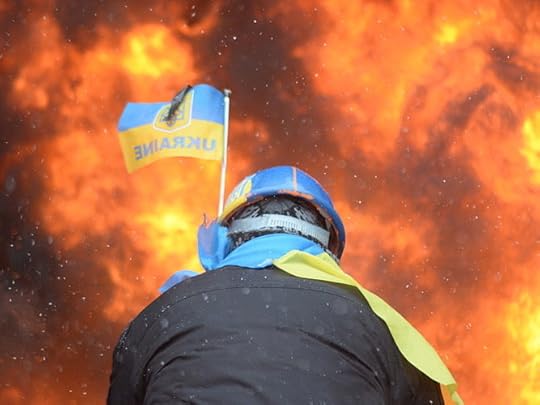
February 7, 2014
A Russian Threat to Ukraine?
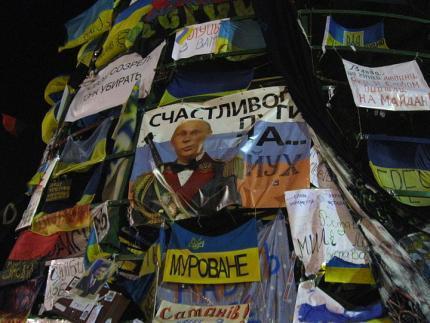
Let’s start with the alarming question many people are now asking and then consider other forms of possible Russian intervention in the ongoing Ukrainian Revolution. It was on January 31st that Vladimir Putin’s former adviser, the economist Andrei Illarionov, shocked Ukrainians with his claim that the Kremlin has already developed several scenarios ranging from “control over all of Ukraine” to “control” over several provinces. His views might have been dismissed as alarmist were it not for the fact that Ukrainians have been expecting a more forceful Russian response to the ongoing revolution for weeks.
Imagine two possible scenarios: (1) a full-scale invasion of all, most, or much of Ukraine and (2) a limited invasion of one or two provinces of Ukraine. In both instances, the point would presumably be annexation, occupation, or longer-term control.
Now let’s ask several sub-questions: (1) Does Russia have the military resources to pull off such operations? (2) Would they succeed? (3) Would they make sense strategically? (4) Would the external and internal consequences be acceptable? We’ll then ask whether Vladimir Putin would be likely to make such moves. Let me state at the outset that, while the answers to (1) and (2) are positive, the answers to (3) and (4) are not. The good news is that Putin would have to be deeply irrational to embark on the kind of full-scale or limited interventions Illarionov has in mind.
As stated, the answer to the first question is an unqualified yes. The Russian armed forces, at about three-quarters of a million troops, are several times larger than the Ukrainian army; their budget allocations are much larger, their weapons more modern, their training better. As their travails in Chechnya have shown, the Russian armed forces are not world-class, but they’re improving, while the Ukrainian army appears to be in terminal decline. Obviously, Russia couldn’t mobilize all its troops in some putative attack on Ukraine, but, whatever the number, they would be more than adequate to defeat Ukraine’s. Russia could also rely on Cossack and other “volunteers” to do some of its dirty work.
The answer to the second question—would such operations succeed?—is less obvious. The Ukrainian military consists of some 150,000 poorly armed, poorly trained soldiers. Would they even fight? Some would, some wouldn’t: those from Luhansk might welcome Russian troops; those from Lviv might shoot back. Chances are, though, that the Russian army would win hands down, especially in a limited invasion of one or two provinces. Would its losses be acceptable to Russians back home? Probably, though that, too, would depend on how protracted and widespread the fighting would be. A more complicated issue is whether the Russian military would have the stomach to deal with the guerrilla resistance that is sure to follow a Ukrainian defeat. A quick, grand, and glorious victory might just lead to cheering in the streets of Moscow and St. Petersburg. A long slog in a huge country might turn into a disaster back home and undermine Putin’s rule. Clearly, a full-scale invasion bears significant risks. A limited invasion would be far more manageable for the Kremlin.
Would either a large-scale or limited invasion make sense strategically? Would either advance Russia’s geopolitical interests? If a large-scale invasion were successful, Russia would presumably come to control Ukraine’s ports, energy grid, and economic resources (as well as, quite possibly, a very disgruntled population). At most, that would be a very mixed blessing. Ukraine’s economy is a mess, its coal and gas reserves are nothing compared to Russia’s (though its potential shale-gas reserves might be large), and its ports need modernization. It’s not immediately clear just how Russian ownership of these resources would enhance Russia’s interests. Owning Ukraine’s aging gas pipeline would be nice—though bringing it up to snuff would cost billions—but it’s not quite as imperative now that Russia has poured, or is planning to pour, billions into constructing the North and South Stream pipelines that bypass Ukraine.
A more significant concern relates to Russia’s internal difficulties with terrorism in the North Caucasus, a region that has pretty much escaped Moscow’s control. Wouldn’t starting a major conflagration with Ukraine mean diverting security personnel from the volatile North Caucasus? Wouldn’t such a Ukrainian adventure encourage Islamic resistance movements to accelerate their campaigns within the Russian Federation? Does Russia really want to fight a two-front war? Here, as with the second point, the risks drop appreciably with a limited incursion into one or two provinces.
Finally, what would the international consequences of a large-scale invasion be? Remember: such a move would mean a crass and blatant violation of every single international norm regarding state behavior. Ukraine poses no threat to Russia. It possesses no weapons of mass destruction and houses no anti-Russian terrorists. An invasion would be just that—an invasion, a blatant aggression, an imperialist land-grab. In violating United Nations norms, the Helsinki Final Act, the standards of the Organization for Security and Cooperation in Europe, and every other postwar accord, Russia would be declaring itself a rogue state. Its ability to play a great-power role as an international mediator would be shot. Its relations with China, Turkey, Europe, and the United States would go into nosedive. A cold war would be likely. North Korea might cheer, and the some on the American left might develop elaborate pro-imperialist justifications, but most of the world would condemn Russia. The rogue state would inevitably become a pariah state.
A limited invasion of one or two provinces—presumably those populated by Russian minorities “clamoring” for “salvation” from “cutthroat bands of Ukrainian fascists”—would have far fewer negative international consequences, and it would certainly be far more doable. But it could also have nasty consequences for the Kremlin’s plans to in-gather former Soviet republics. What would Kazakhstan’s President Nazarbayev say if Putin annexes Russian-populated Ukrainian territories? How would President Lukashenko of Belarus react? Northern Kazakhstan is inhabited by Russians and Russian speakers; most of Belarus consists of Russian and Russian speakers. If Putin can in-gather Ukraine’s Russians with impunity, why should he stop there? One thing’s for sure, under conditions such as these, Putin’s playthings—the Custom’s Union, the Eurasian Union, and the Russian World project—would die.
But let’s imagine Putin does opt for a limited intervention—perhaps by Russian Cossacks and irregulars pining to deal a mortal blow to the greatest threat to world peace, some non-existent Ukrainian fascism. Which provinces might he want to annex? Well, there’s the Crimea, of course, except that Russia de facto controls most of it anyway. Sevastopol, where the Russian Black Sea Fleet is based, is a Russian city that pretty much does what it likes. De jure control of the Crimea or Sevastopol might be nice, but would it be worth the bother and risk? Maybe, maybe not. The other two provinces with large Russian populations in need of potential liberation from cutthroat Ukrainian fascists are Luhansk and Donetsk. The Donbas is the unredeemable Ukrainian rust belt, a post-industrial economic cesspool that would require trillions in investment to bring it into the 21st century. Does Putin need such a drag on the stagnating Russian economy at precisely the time that his gas weapon has become blunted due to the shale gas revolution?
In sum, the strategic costs of any kind of invasion could be very high and the strategic benefits are at best uncertain. If Putin is a rational statesman motivated primarily by considerations of Realpolitiak and geopolitics, he would not invade. If Putin is a fascistoid leader who needs imperial talk to legitimate his rule, the outcome is somewhat less certain, but with one important qualification. Imperial talk and chest beating are one thing, and Putin is a master of both. Chest beating does not, however, necessarily translate into war making. It can—as we know from Hitler—but, more often than not, it just results in sabre-rattling, scowling, and an eventual return to one’s cave.
I conclude from the above that—if we assume that Putin is motivated by geopolitical rationality—a large-scale invasion of Ukraine is too risky and, thus, highly unlikely, while a small-scale intervention is unnecessary and, thus, highly unlikely. Not impossible, mind you, just highly unlikely. Dictators the world over, and especially machismo-inspired fascistoid dictators, are prone to strategic mistakes, and one cannot exclude the possibility that even the cold-blooded Putin might experience a frisson of excitement from imagining his troops planting the Russian tricolor in the smoking ruins of Lviv.
If not an invasion, then what? Far more in Putin’s interests is a weak and pliant Ukraine. If you can advance all your interests by kicking around a 99-pound weakling, why not do so? Why pummel him to death? Ukraine already is weak and pliant. The Ukrainian Revolution is unlikely to make it stronger anytime soon. (A democratic Ukraine may become an economic powerhouse sometime in the next decade, but that’s a very long time in the world of politics.) If the Yanukovych regime cracks down, initiates a bloodbath, and sparks a civil war, Russia could be “dragged into” a conflagration with all the risks mentioned above. A huge failed state on its southwestern border cannot be construed as stabilizing and security-enhancing by any rational Russian policymaker. A smashing victory for the democratic opposition would also be undesirable. It’s far better for Russia for the Ukrainian Revolution to result in some kind of negotiated solution, with or without Yanukovych.
OG Image: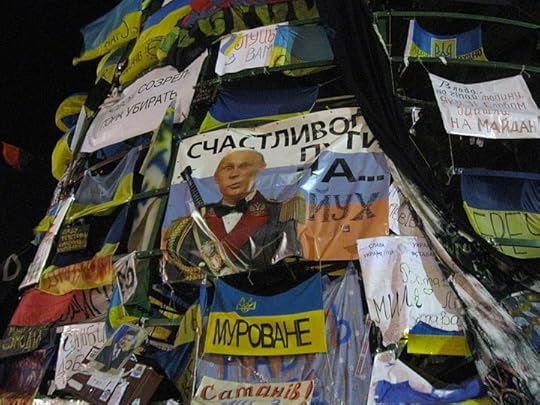
January 28, 2014
Ukraine’s Three Revolutionary Breakthroughs
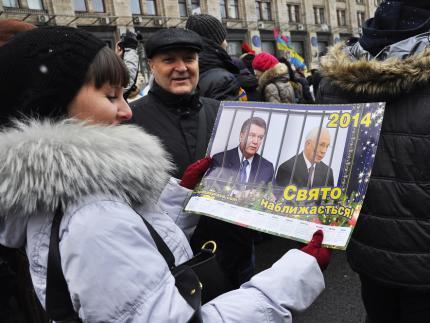
The end of the criminal Yanukovych mafia regime may be nearer than we think. Three developments in the last week mark sea changes that favor the democratic opposition.
First, the regime’s elite guards—the Berkut riot police—shot and killed several demonstrators. Another man was disappeared by a death squad, tortured, and killed. These actions were criminal, but they were also profoundly stupid. In killing at least five young men, the Yanukovych regime has provided the democratic revolutionaries with something every revolution needs: martyrs and symbols. The Ukrainian revolution of 2014 now has its Nathan Hale (hanged by the British in 1776), its Medgar Evers (killed by white racists in 1963), its Benno Ohnesorg (killed by the West German police in 1967), and its Steve Biko (killed by the apartheid South African regime in 1977).
As Yanukovych will soon learn, you can’t fight martyrs, and you definitely can’t fight symbols. They will remain permanently alive, inspiring the struggle and promoting implacability and irreconcilability. In martyring five men, the regime made them into invincible enemies who will hasten its end.
Second, the democratic opposition declared that it was forming an alternative parliament—the People’s Rada. Thus far, the democratic Rada is a paper institution, but, unless the democrats suffer a sudden loss of political will, it will progressively grow into a real parliament that issues legislation, appoints governing bodies, and rewrites the Constitution. Local branches of the Rada have already banned the Regionnaires and Communists in Ternopil, Ivano-Frankivsk, Chernivtsi, and Khmelnytsky provinces. Unless nipped in the bud—and there is hardly any way the regime can do that without crushing the entire country—the People’s Rada will quickly evolve into a contender for sovereignty. Since it will enjoy popular legitimacy, it will eventually reduce the Supreme Rada, the discredited faux parliament run by the Regionnaire thugs, to a sideshow of political has-beens. If and when that happens, the regime is pretty much dead.
Yanukovych, who may still remember some of the Soviet history he learned in grade school, will recognize this as a condition of “dual sovereignty” similar to what emerged in Russia after the February Revolution of 1917. Then the socialists established the Soviet of Workers’ and Soldiers’ Deputies, thereby spelling the beginning of the end of the provisional government. Yanukovych may also remember that the Soviet had armed self-defense detachments. The Maidans in Kyiv and elsewhere may soon have them as well. When they do, the Berkut thugs, whose courage extends only to beating defenseless and wounded protesters, will head for the hills.
Finally, the Euro Revolution in Kyiv has become the Ukrainian Revolution. Grassroots Ukrainians throughout the country have begun to seize the buildings housing Yanukovych’s governors, thereby taking control of the Provincial State Administrations they ran. As of this writing, the state administrations in Lviv, Ternopil, Ivano-Frankivsk, Rivne, Lutsk, Zhytomyr, Khmelnytskyy, Chernivtsi, Vinnytsya, Poltava, and Kyiv (city) are in the hands of revolutionaries; those of Kyiv, Chernihiv, and Kherson province are under assault; those of Dnipropetrovsk, Zaporizhzhya, Sumy, and Cherkasy have been recaptured by pro-state forces. Government forces are relying on hired goons known as “titushky” for help; they will prove to be unreliable as the standoffs continue and the weather refuses to get warmer. In the meantime, expect Ukrainians to continue seizing the levers of local power and claiming their bit of sovereignty at home.
This development has, in effect, “decentered” the Kyiv Maidan. At this point, if the Kyiv revolutionaries lose the territory of the Maidan to the riot police (and there are rumors that the long-awaited crackdown will soon come), nothing will change in terms of the overall correlation of forces. After all, only thousands of Ukrainians could travel to Kyiv from the provinces to participate in the Maidan. Millions can now pursue revolutionary goals by staying right at home—on their own turf, where the Berkut is far outnumbered by the people. They can either seize the state administrations or other offices or, like the soccer fan clubs of Kyiv, Odessa, Sevastopol, Kharkiv, Donetsk, Luhansk, and Dnipropetrovsk, join in protecting local Maidans from the predations of regime-hired goons. By the way, these clubs are not just groups of beer-guzzling fans: given the extreme weakness of self-organization in Ukraine’s southeast, fan clubs may actually be said to represent local civil society.
Yanukovych’s worst nightmare is coming true: the revolution has spread and will continue to spread. It is no longer focused on the capital. It is now completely beyond his control. Regionalization of the revolution also has important tactical consequences. Up to now, the regime could concentrate its police forces in Kyiv. It can’t do that anymore—which is good for Kyiv. But neither does the regime have enough riot police and internal troops—at most 35,000—to control a huge country with 25 provinces. And some of them have already begun defecting from what is becoming an increasingly obvious lost cause.
The writing is on the wall.
After the Bastille fell on July 14, 1789, Louis XVI asked, “Is it a revolt?” The Duke de La Rochefoucauld answered: “No, Sire, it’s a revolution.” Louis, as you know, lost his head.
OG Image: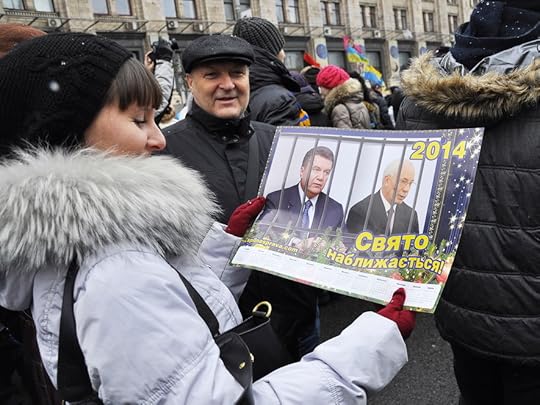
January 22, 2014
Yanukovych Invites Violence
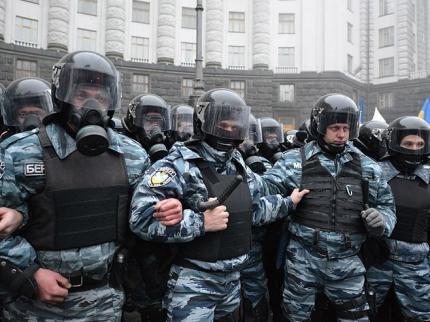
It was all quite predictable. How could the gangster regime of an avaricious sultan not provoke an uprising by a population tired of being systematically and relentlessly plundered and abused? You don’t have to be an expert on revolutions and rebellions to know that, at some point, all decent people will say to their oppressors: enough is enough.
The only question now is: Is sporadic violence enough for the regime? Disappearances, beatings, and even killings have become more common. Will the regime now go into full occupation mode and employ mass violence against the protestors in Kyiv and elsewhere?
Hired thugs and riot police (in case you’re wondering what the difference between the two is, the latter wear helmets) are being bused into Kyiv. The troops confronting the protesters appear to have developed increasingly itchy fingers, firing rubber bullets and explosive devices into the crowds. Push appears to be coming to shove.
The risks associated with a violent crackdown are extremely high, and the sultan knows that. After all, if there’s one thing Viktor Yanukovych understands, it’s violence. He grew up in a violent environment; he employed violence as a teenage gangster; he was both the object and subject of violence in prison; he uses well-placed punches to keep his minions in line. Indeed, considering his abysmal record as president of Ukraine—which essentially ended when he willfully, consciously, and voluntarily abandoned that position by betraying the people’s trust and opting for occupation—violence may be the only thing the man understands.
If all goes according to plan, the riot police will clean out the Maidans in Kyiv and other cities quickly and efficiently. Heads will be cracked, lives will be lost, but let the stupid liberals in the West worry about that. Putin will shower the sultan with accolades for having resisted Western imperialism. The Regionnaire thugs will congratulate one another on a job well done. As the people return to servitude, the occupation regime will be able to get on with its raison d’être: plunder. All will be well again.
But what if things do not go according to plan? After all, Yanukovych must know that the only person who is perfectly predictable and reliable when it comes to violence is himself. What if the riot police don’t act as quickly and efficiently as he would? What if they clean out some Maidans, but not others? What if all the heads that need to be cracked and all the lives that need to be lost aren’t? And what if the people don’t return to servitude? What if they continue to resist—some openly, some covertly, some peacefully, and some violently?
Yanukovych knows one thing from the gangster world that molded him as a young man: that violence works only when it works completely. He must therefore know that a violent crackdown has to be total and totally successful. Anything short of the complete elimination of a rival gang is unacceptable. Anything short of the complete elimination of the Euro Revolution is equally unacceptable.
Are the militia, internal troops, and riot police as dependable as Yanukovych himself? Will they blink when ordered to initiate a bloodbath? Will they shoot women? Will they stand fast in the face of determined opposition and Molotov cocktails? Will they be able to look their neighbors, their wives, their children, their friends in the eye? That’s the problem with being the coercive handmaidens of a non-foreign occupation regime: you have to both kill people and continue to live among the people you’re killing. There have been reports suggesting that some units have engaged the democrats in negotiations about immunity. If so, Yanukovych must be cursing the fact that there’s only one of him.
No less worrisome is the possibility of continued resistance. Ukraine is a big country and at least two-thirds is populated by people who detest the occupation regime. Imagine that the crackdown in Kyiv succeeds. Is Yanukovych ready for the emergence of small-scale, hit-and-run actions in the provinces? If destroying the physically compact Maidan in Kyiv is a challenge, just imagine how much more difficult it will be to put an end to resistance in hundreds or thousands of cities, towns, and villages? The sultan does have an enormous security apparatus, but will local militia men be willing to kill their friends and neighbors? And what will local Regionnaires do when they and their property become the targets of local resistance movements?
Yanukovych has no good options. If he does nothing, the Euro Revolution continues. If he cracks down, the Euro Resistance continues. Either way, Ukraine becomes ungovernable and his occupation regime becomes even more unstable. A smart politician would negotiate in good faith. A violence-prone sultan will do what comes naturally to him. Yanukovych thinks he’s tightening the noose around the opposition. In actuality, it’s his head that’s in the rope.
One more thing, just in case some European politicians are reading this blog. If you want to forestall a bloodbath or a civil war in a neighboring country, you easily can. The Yanukovych criminals all have their banking accounts and real-estate assets in your countries. Freeze them. Just say no to Regionnaire violence. Unless, of course, it’s easier to say yes to Regionnaire money.
OG Image: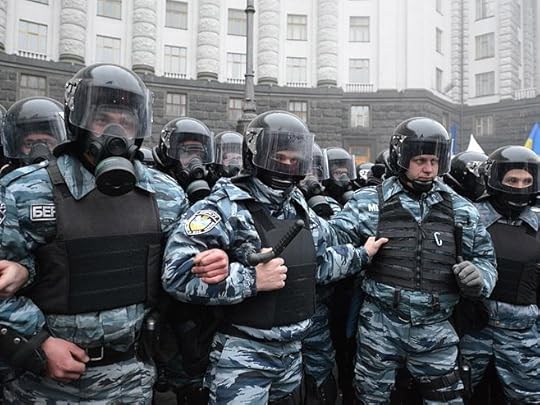
January 21, 2014
Standoff in Ukraine: Mafia Regime vs. Mobilized Citizens
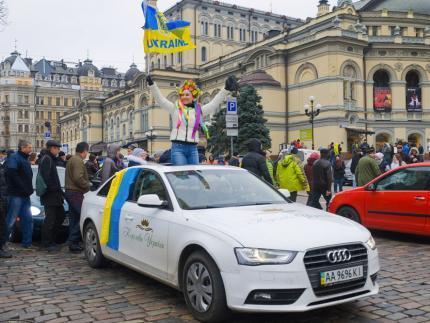
At first glance, the world appears to be coming to an end in Ukraine: President Yanukovych is still in power, he’s signed a neocolonial deal with Russia, and he approved a whole raft of repressive legislation on January 16th. But wait: Take a deep breath, examine all the evidence, and you may conclude that things aren’t quite as bad.
Let’s compile a ledger of the things that have definitely gotten worse in the last few months, the things that haven’t changed, and the things that have gotten better. And then let’s see whether we can come up with a more or less reasonable assessment. It goes without saying, of course, that by better or worse I mean better or worse for Ukrainian democracy, for the Ukrainian people, for freedom. By extension, what’s bad for Yanukovych is good for Ukraine.
Here are three things that belong on the bad side of the ledger:
The Yanukovych–Putin pact saved the Ukrainian tyrant’s skin and pushed Ukraine along the road toward neocolonial status vis-à-vis Russia.
Regime violence has increased and is likely to continue increasing.
Anti-regime violence, provoked by years of regime violence, finally occurred on January 19th.
Here are a few that haven’t changed and are unlikely to change:
The Yanukovych mafia regime’s authoritarianism, corruption, and weakness.
Yanukovych’s despotism, incompetence, and callousness.
Regime determination to manipulate the 2015 presidential elections.
The Yanukovych economy’s inability to grow.
The fascistoid Putin regime’s authoritarianism, corruption, and weakness.
Putin’s charisma and macho bluster.
The Putin economy’s inability to grow.
The end of Putin’s energy monopoly.
The European Union’s interest in Ukraine.
Here are several things that have changed for the better:
The illegitimacy of Yanukovych and his regime is fully evident.
Ukrainians have demonstrated that they are not apathetic, want to be free, and are capable of sustained and repeated mass mobilization.
Ukrainians formed a mass movement, the “Maidan People’s Association,” with the potential to become a stable mass-based opposition.
The United States has abandoned its “Ukraine fatigue” and is now concerned about the country.
The Ukrainian diaspora has mobilized around the Euro Revolution and will become a permanent thorn in the side of the Yanukovych regime.
Pessimists generally place many of the points in my second category—of things that haven’t changed—into the bad column and thereby render a less rosy picture. But the fact of the matter is that the Yanukovych regime has remained quite consistent since 2010. It was a thuggish, brutal, nasty, and corrupt dictatorship before the Euro Revolution. And it’s remained true to itself ever since. We shouldn’t be surprised that such a regime would fail to listen to the demonstrators, and thereby further weaken itself.
The January 16th measures hurriedly passed by a rump parliament are illegal, but then again everything the regime has been doing since late 2010, when Yanukovych arrogated to himself the powers of a super-presidency and transformed himself into a sultan, has been anti-constitutional and, thus, illegal. The significance of the January 16th measures is not that they ushered in a repressive, violent, thuggish dictatorship, but that the Regionnaires openly and brazenly violated the Constitution in adopting them. Knowing full well that their legitimacy is nil, they adopted not laws, but threats. As opposition leader Vitali Klitschko said, the “authorities declared war on the people of Ukraine.” And the regime did so consciously, knowing that it is an occupation force.
Not surprisingly, anti-regime hotheads responded in kind on Sunday, January 19th. Violence always begets violence, and it was probably inevitable that individuals unaffiliated with the peaceful Maidan movement should have taken to attacking the police and firebombing their vehicles—on the order of disaffected minority rioters in the United Kingdom and France. I’ve put this in the bad column, because the regime could take advantage of it to attack and discredit the peaceful demonstrators. On the other hand, if it’s true that the Yanukovych mafia regime understands only force, then the riots may put the fear of God into it.
The other thing that hasn’t changed is the brittleness of the fascistoid Putin regime. I’ve written extensively about this elsewhere (see “Fascistoid Russia,” March/April 2012), but the reality is that a leader-centered corrupt authoritarian regime that rests on easy energy money is only strong if the leader remains charismatic and young, the corruption keeps getting fed easy money, and easy money keeps coming from oil and gas. But even Putin is getting old, the Russian economy is about to enter a decade of minimal growth, and Russia’s famed energy card looks decidedly less impressive in light of shale gas and liquid natural gas developments in the United States and Europe. Putin can beat his chest and talk empire—after all, he has to in order to maintain his image as the Big Man on Horseback—but his state and economy are too weak to sustain empire.
So, when you consider these features in relation to the neocolonial implications of the Yanukovych–Putin pact, you may want to relax a bit. Being a semi-colony will bring Ukraine no good, but Ukraine is highly unlikely to acquire genuine colonial status and it is highly likely to morph out of semi-colonial status as both the Yanukovych regime and the Putin regime experience their inevitable times of troubles.
Increasing Yanukovych regime violence is a definite bad, but it too has to be viewed in relation to all the goods that have emerged in the last two months. A mafia regime can do—and already has done—untold harm to innocent human beings, but violence pure and simple is not a sustainable strategy in the medium term, especially in a country with a highly developed civil society, mass-based opposition movement, and a demonstrated capacity to respond in kind. Does the Yanukovych regime want to provoke mass violence and a civil war that it may not win?
Moreover, forces of coercion are very expensive and they produce nothing of value economically. Any regime that relies on them only for its existence is doomed to economic contraction, which in turn means declining opportunities for elite theft, growing popular discontent, and the growing likelihood of anti-regime violence. (As the French diplomat Talleyrand once said, “The only thing you cannot do with a bayonet is sit on it.”) Such a condition is inherently unstable—especially if rapacious regime elites begin to feel the heat, as they will if the United States, Canada, and the European Union impose sanctions on the most egregious crooks and the Ukrainian diaspora helps expose illegally financed Regionnaire assets in the West.
Even if you disagree with my threefold categorization, you may agree that a closer look at Ukraine’s current straights suggests that things aren’t quite as bad as they look to a sometimes despondent popular movement that expected the camarilla exploiting the country to cease being a camarilla and cease exploiting the country after several weeks of mass protests. I’d say the situation resembles an unstable standoff between the mafia regime and the mobilized people. Regime violence and thuggishness will not let up, at least for the foreseeable future. But neither will popular resistance and outside pressure. As one American ex-pat wrote to me from Kyiv, “I think we’re looking at years’ worth of low-grade revolution over here. Seems like every time I go outside I walk into a demonstration in front of this official office or that one, and I see no indication that people are not in this for the long, long, long haul.”
The possibilities for change, especially for the good, are immense, and that uncertainty is terrifying. Still, the “correlation of forces” (as the Soviets used to put it) favors the democratic opposition, particularly in the medium to long run, for the simple reason that, whatever the weaknesses of the Euro Revolutionaries, the Yanukovych regime is much weaker. I’ve been betting against Yanukovych and Putin for the last few years. I still am.
OG Image: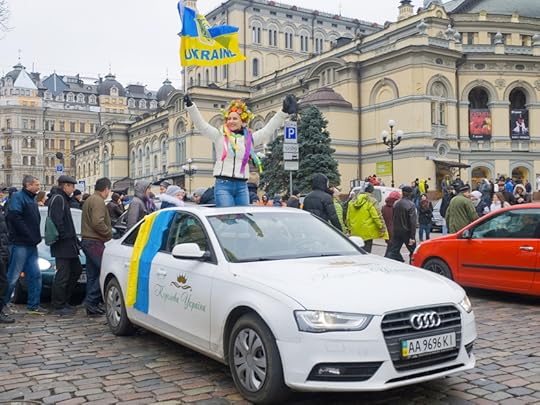
Alexander J. Motyl's Blog
- Alexander J. Motyl's profile
- 21 followers



